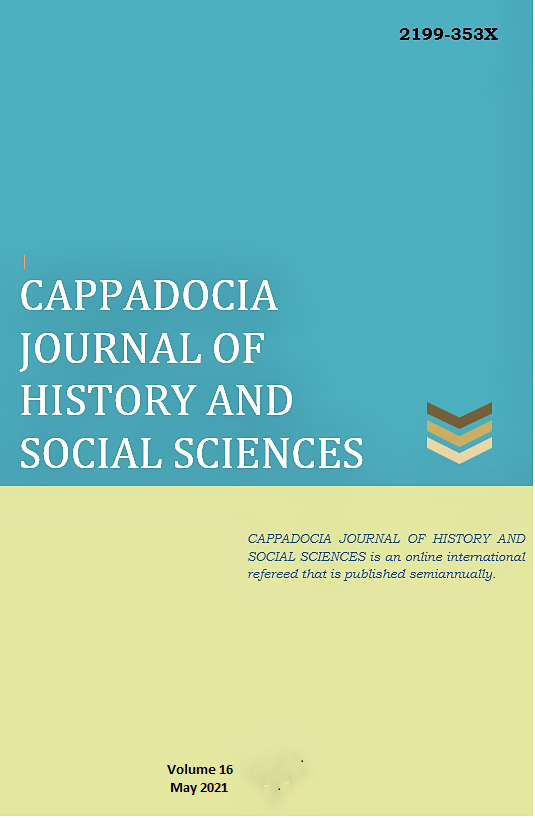Author :
Abstract
Özet
Eski Ön Asya coğrafyası günümüzde yürütülen pek çok mesleğin oluşturulmasında köken oluşturan bir bölge olarak karşımıza çıkmaktadır. Bu meslek gruplarından biri ise malāhu(m)’dur. Eski Ön Asya coğrafyasında bir meslek grubu olarak karşımıza çıkan malāhu(m) Türkçe karşılığı olarak “gemici, kayıkçı” olarak kaynaklarda yer etmiştir. Malāhu(m) bazı metinlerde gemiyi inşa eden kişi olarak karşımıza çıkarken bazı metinlerde gemiyi kullanan kaptan olarak nitelendirilmiştir. İki nehir arası anlamına gelen Mezopotamya ise, gemicilik mesleğinin ortaya çıkmasında önemli rol oynamış ve çivi yazılı belgelerde bu hususlarda bilgiler elde edilmiştir. Özellikle Sumer, Babil, Mari ve Asur metinlerinde gemi ve gemicilik mesleğine dair elde edilen bilgiler oldukça değerlidir. Malāhu(m) özellikle ticari hayatta sevkiyatların sağlanmasında, yolcu ve yük taşımacılığı görevlerinde bulunmuştur. Eski Anadolu coğrafyasında Kültepe kaynaklarından elde edilen verilere göre ise özellikle nehir göl gibi sularda kişilerin ve ürünlerin belirli bir bölgeye götürülmesi görevinde bulunmuşlardır. Bununla birlikte malāhu(m)’ların çeşitli hak ve sorumlulukları kanunlar vasıtası ile güvence altına alınmıştır. Malāhu(m) kelimesinin geçtiği Sumerlere ait kanunlar arasında Urukagina’nın Reformu, Ur-Nammu Yasası, Lipit-İştar Kanunu ve Eşnunna Kanunu yer alırken, Babillere ait olan Hammurabi Kanunun da yine malāhu(m)’a dair hukuki maddelerin yer aldığı bilgiler tespit edilmiştir. Malāhu(m)’lar aynı zamanda Tufan Olayı, Gılgamış Destanı, Enki ve Dünya Düzeni Miti, Enlil ve Ninlil Miti gibi Sumer edebi metinlerinde de sık sık karşımıza çıkarak edebi karakterler olarak metinlerde yerlerini almışlardır.
Keywords
Abstract
Abstract
The Ancient Near East geography appears as a region that forms the origin of many professions carried out today. One of these occupational groups is malāhu (m). Malāhu (m), which appears as a profession group in The Ancient Near East geography, has been included in the sources as "seaman, boatman" in Turkish. While Malāhu (m) appears as the builder of the ship in some texts, it is described as the captain using the ship in some texts. Mesopotamia, which means between two rivers, played an important role in the emergence of the shipping profession and information on these issues was obtained in cuneiform documents. Especially in the texts of Sumer, Babylon, Mari and Assyria, the information obtained about the ship and the seafaring profession is very valuable. Malāhu (m) took part in passenger and freight transport duties, especially in the provision of shipments in commercial life. According to the data obtained from Kültepe sources in the ancient Anatolian geography, they had the task of transporting people and products to a certain region, especially in waters such as rivers and lakes. However, various rights and responsibilities of the malevolent (m) 's are guaranteed by laws. Among the laws belonging to the Sumerians where the word Malāhu (m) is mentioned, the Reform of Urukagina, the Ur-Nammu Law, the Lipit-Ishtar Law and the Eşnunna Law, while the Hammurabi Law, which belongs to the Babylonians, also contains information about the legal provisions of has been. Malāhu (m) 's also frequently appear in Sumer literary texts such as the Flood Event, the Epic of Gilgamesh, the Myth of Enki and the World Order, Enlil and the Ninlil Myth, and took their place in the texts as literary characters.
Keywords
- Albayrak, İ. (2005). Kültepe’den Bir Toplu Kayıt Belgesi. Türkiye Sosyal Araştırmalar
- Albayrak, İ. (2005). Kültepe’den Bir Toplu Kayıt Belgesi. Türkiye Sosyal Araştırmalar Dergisi.
- Albayrak, İ., Öz Kiriş, E., & Erol, H. (2019). Çivi Yazılı Belgeler Ve Arkeolojik Verilere Göre Eski Babil Döneminde Nehir Ulaşımı. ArchıvumAnatolıcum.
- Bilgiç, E. (1963 ). Eski Mezopotamya Kavimlerinde Kanun Anlayışı ve Ananesi. Ankara Üniversitesi Dil ve Tarih-Coğrafya Fakültesi Dergisi.
- CAD: Cıvıl, M.,Gelb, I. J., Oppenheım, A. L., &Reıner, E. (Dü). (1977). The Assyrian Dictionary of the University of Chicago. 10. U.S.A.: The Orıental Instıtute.
- Casson, L. (1994). Ships And Seafaring İn Ancient Times. Austin: Universisty of Texas Press.
- Casson, L. (1971). Ships And Seamanship İn The Ancient World. New Jersey: Princeton University Press.
- Casson, L. (1964). The Ancient Mariners: Seafarers And Sea Fighters Of The Mediterranean İn Ancient Times. New York: Macmillan.
- CDA: Black, J., George, A., & Nicholas, P. (2000). A Concise Dictionary Of Akkadian. Harrassowitz Verlag - Wiesbaden: 2nd (corrected) printing.
- Crawford, H. (2015). Sümer ve Sümerler. Çev. N. Uzan. Ankara: Arkadaş Yayınevi.
- Erol, H. (2007). Eski Asurca Metinlerde Meslek Adları ve Unvanlarla Geçen Şahıs İsimleri (Yüksek Lisan Tezi). Ankara.
- ETCSL: The Electronic Text Corpus of Sumerian Literature. https://etcsl.orinst.ox.ac.uk/George, A. (2003). The Babylonian Gilgamesh Epic: İntroduction, Critical Edition And Cuneiform Texts. Newyork: Oxford University Press.
- Gılgamış Destanı, (2018). Hasan Ali Yücel Klasikler Dizisi, Çev. S. Maden. İstanbul: Türkiye İş Bankası Kültür Yayınları.
- Günbattı, C. (2005). Kültepe'de Bulunmuş İki Antlaşma Metni. Belleten , LXIX (256).Güney, E. (1990). Dicle Irmağında Kelek Taşımacılığı. Coğrafya Araştırmaları (2). Herodotos. (2017). Tarih. İstanbul: Türkiye İş Bankası Kültür Yayınları.
- İplikçioğlu, B. (1990). Eskiçağ Tarihinin Anahatları I. İstanbul: Edebiyat Fakültesi Basımevi.
- Kramer, S. N. (2002). Sumerler-Tarihleri, Kültürleri ve Karakterleri. İstanbul: Kabalcı Yayınevi.
- Kramer, S. N. (1999). Tarih Sümerle Başlar. İstanbul: Kabalcı Yayınevi.
- Kulakoğlu, F. (2011). Kültepe Kaniş-Karumu: Anadolu'nun En Eski Uluslararası TicaretMerkezi. Anadolu'nun Önsözü-Kültepe Kaniş-Karumu-Asurlular İstanbulda. içinde Kayseri: Kayseri Büyükşehir Belediyesi Kültür Yayınları.
- Leick, G. (2003). Historical Dictionary of Mesopotamia, The Scarecrow Press Inc, Lanham
- Mäkelä, T. T. (2002). Ship And Shipbuilding İn Mesopotamia (C.A. 3000-2000 B.C.) Texas: Texas A& M University, M.A. Thesis.
- Mandacı, E. (2018). Eski Mezopotamya'da Bir Ulaşım Aracı: Gemi. B. Gökce, & P.Pınarcık (Dü) içinde, Eski Yakın Doğu'da Ulaşım Üzerine Yazılar-Articles On Transportation Ancient Near East. Ankara: Akademisyen Kitabevi.
- Öz Kiriş, E. (2018). Kültepe Metinlerinde Geçen Ulaşım ve Taşıma Araçları. B. Gökce,& P. Pınarcık (Dü) içinde, Eski Yakın Doğu'da Ulaşım Üzerine Yazılar-Articles OnSağlamtimur, H.,& Ozan, A. (2017). Mezopotamya'da Nehir Taşımacılığı. TINA: Denizcilik Arkeolojisi Dergisi (8).
- Sever, H. (1990). Kültepe Metinlerine Göre “birtum” Kelimesinin Yeni Anlamı. X. TTK Bildirileri. Ankara.
- Şahin, H. A. (2017). Sumer Mitolojisi. R. Duran (Dü.) içinde, Mitoloji ve Din. Eskişehir: Anadolu Üniversitesi Basımevi.
- Tosun, M. & Yalvaç, K. (1989). Sumer Babil Assur Kanunları Ve Ammi-Şaduqa Fermanı. Ankara: Türk Tarih Kurumu Basımevi.





